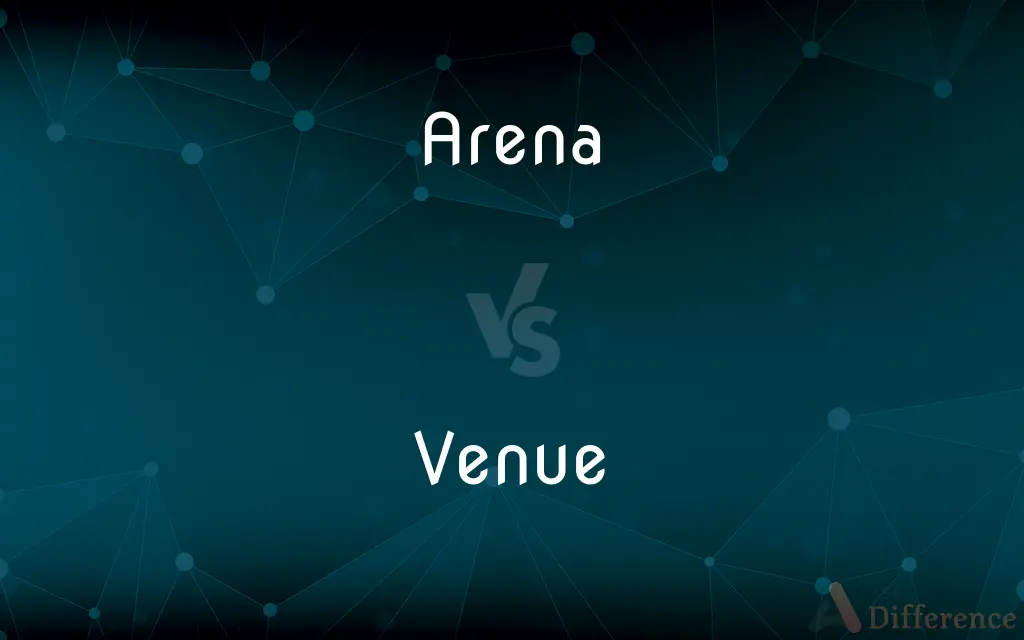Arena vs. Venue — What's the Difference?
Edited by Tayyaba Rehman — By Fiza Rafique — Updated on March 15, 2024
An arena is a large, enclosed area designed for sports and entertainment, often with a central stage or field, while a venue is a broader term for any place hosting events, including arenas, halls, and theaters.

Difference Between Arena and Venue
Table of Contents
ADVERTISEMENT
Key Differences
An arena is typically characterized by its large, often circular or oval shape, designed to host sports events, concerts, and large-scale entertainment with spectators seated around a central area. This design facilitates an unobstructed view of the event for all attendees, emphasizing the communal viewing experience. On the other hand, a venue refers to any location where an event takes place, ranging from small coffee shops for poetry readings to grand concert halls for orchestral performances. The term venue does not specify the size or design of the place, making it a more inclusive term.
Arenas are often found in cities and are significant for their capacity to hold thousands of people, making them ideal for events that attract large crowds, such as basketball games or major music concerts. They are engineered with specific acoustics and seating arrangements to enhance the spectator experience. In contrast, venues can vary greatly in capacity, from intimate spaces that hold a few dozen people to large arenas and stadiums. The choice of venue is dictated by the nature of the event, the expected audience size, and the ambiance the organizers wish to create.
Another aspect of arenas is their indoor setting, which provides a controlled environment for events, protecting them from the unpredictability of weather. This makes arenas a preferred choice for events that require technical setups, such as lighting and sound systems, which might be affected by outdoor conditions. Meanwhile, venues can be either indoor or outdoor, offering flexibility in the type of events they can host. Outdoor venues are chosen for their natural ambiance and are often used for weddings, festivals, and open-air concerts.
The operation and management of arenas are typically overseen by organizations or companies specializing in large-scale event hosting, equipped to handle the logistics, security, and maintenance challenges of such large venues. Venues, depending on their size and purpose, might be managed by a wide range of entities from individual owners for small venues to large corporations for bigger spaces. This affects everything from booking procedures to the types of events hosted.
In terms of cultural significance, arenas often become landmarks in their cities, associated with memorable sports and music events. They contribute to the cultural fabric of a community, becoming points of pride and historical significance. Venues, while also significant, offer a broader cultural contribution by accommodating a wide range of events, including local community gatherings, which might not require the scale or specific features of an arena.
ADVERTISEMENT
Comparison Chart
Definition
A large, enclosed area for sports and entertainment
A place where any event occurs
Capacity
Typically large, holding thousands
Can vary from small to large
Design
Circular or oval, with central stage/field
Varies widely depending on the event
Location
Often urban
Can be anywhere
Type of Events
Sports, concerts, large-scale events
Any, including meetings, weddings, concerts
Management
Usually by specialized organizations/companies
Varies, from individuals to corporations
Cultural Significance
Often landmarks and points of pride
Broad cultural contribution through diverse events
Compare with Definitions
Arena
Often circular or oval-shaped.
The arena's oval shape ensures every seat has a good view.
Venue
Managed by a variety of entities.
The historic venue is managed by a local nonprofit organization.
Arena
Designed with a central stage for events.
The arena's central stage was set up for the championship game.
Venue
Can range from small to large spaces.
They chose a small venue for their company meeting.
Arena
Used for large-scale entertainment.
The arena hosted a sold-out concert last weekend.
Venue
Flexible in terms of event type.
The venue hosts both theatrical productions and conferences.
Arena
A large, indoor space for sports and concerts.
The new arena can seat 20,000 spectators for basketball games.
Venue
Includes indoor and outdoor locations.
The outdoor venue was perfect for the summer concert.
Arena
Enclosed and equipped for spectator comfort.
The arena's climate control keeps events comfortable year-round.
Venue
A place where events are held.
The venue for the wedding is a beautiful garden.
Arena
An arena is a large enclosed platform, often circular or oval-shaped, designed to showcase theatre, musical performances, or sporting events. It is composed of a large open space surrounded on most or all sides by tiered seating for spectators, and may be covered by a roof.
Venue
The place where something happens, especially an organized event such as a concert, conference, or sports competition
The club is the city's main venue for live music
Arena
An enclosed area for the presentation of sports events and spectacles.
Venue
The scene or setting in which something takes place; a locale
"that non-cinematic venue of popular nightmares, the discotheque" (P.J. O'Rourke).
Arena
A building housing such an area.
Venue
A place for large gatherings, as a sports stadium.
Arena
A place or scene where forces contend or events unfold
Withdrew from the political arena.
The world as an arena of moral conflict.
Venue
The court where a lawsuit may or should be tried, usually because the cause of action arose in that locality.
Arena
The area in the center of an ancient Roman amphitheater where contests and other spectacles were held.
Venue
The locality from which a jury may be drawn.
Arena
An enclosed area, often outdoor, for the presentation of sporting events (sports arena) or other spectacular events; earthen area, often oval, specifically for rodeos (North America) or circular area for bullfights (especially Hispanic America).
A large crowd filled the seats of the arena.
Venue
The locality where a crime is committed.
Arena
The building housing such an area; specifically, a very large, often round building, often topped with a dome, designated for indoor sporting or other major events, such as concerts.
The arena is grey with white beams.
Venue
A theater, auditorium, arena, or other area designated for sporting or entertainment events.
Arena
(historical) The sand-covered centre of an amphitheatre where contests were held in Ancient Rome.
The gladiators entered the arena.
Venue
(legal) A neighborhood or near place; the place or county in which anything is alleged to have happened; also, the place where an action is laid, or the district from which a jury comes.
Arena
A realm in which events take place; an area of interest, study, behaviour, etc.
The company was a player in the maritime insurance arena.
Venue
(obsolete) A bout; a hit; a turn.
Arena
The area in the central part of an amphitheater, in which the gladiators fought and other shows were exhibited; - so called because it was covered with sand.
Venue
(sports) A stadium or similar building in which a sporting competition is held.
Arena
Any place of public contest or exertion; any sphere of action; as, the arenaof debate; the arena of life.
Venue
(by extension) The place where something happens.
The metalworking forum is not the appropriate venue for this discussion about politics.
Arena
"Sand" or "gravel" in the kidneys.
Venue
A neighborhood or near place; the place or county in which anything is alleged to have happened; also, the place where an action is laid.
The twelve men who are to try the cause must be of the same venue where the demand is made.
Arena
A particular environment or walk of life;
His social sphere is limited
It was a closed area of employment
He's out of my orbit
Venue
A bout; a hit; a turn. See Venew.
Arena
The central area of an ancient Roman amphitheater where contests and spectacles were held; especially a sand-strewn area
Venue
The scene of any event or action (especially the place of a meeting)
Arena
A large structure for open-air sports or entertainments
Venue
In law: the jurisdiction where a trial will be held
Arena
A playing field where sports events take place
Common Curiosities
What makes an arena different from other venues?
Arenas are specifically designed for large-scale sports and entertainment events, with a central stage or field and seating arranged around it to accommodate thousands of spectators.
How do venues contribute to cultural significance?
Venues contribute to cultural significance by hosting a variety of events, from local community gatherings to major concerts, reflecting and shaping the cultural landscape.
Are all large event spaces called arenas?
Not necessarily; while arenas are large spaces, not all large event spaces are arenas. The term 'arena' is specific to venues designed for sports and large-scale entertainment with a central viewing area.
How does the capacity of an arena compare to other venues?
Arenas have a higher capacity, often designed to accommodate thousands of spectators, compared to other venues which may have a more variable capacity.
Can the same place be considered both an arena and a venue?
Yes, an arena is a type of venue, specifically designed for certain types of large events, so it falls under the broader category of venues.
Do venues have specific designs?
The design of a venue depends on its intended use; while arenas have a specific design for spectator events, other venues can vary widely in design.
What types of events are best suited for an arena?
Sports events, concerts, and other large-scale entertainment events are best suited for arenas due to their design and capacity.
Can any place be a venue?
Yes, any place that can host an event, regardless of size or location, can be considered a venue.
Can a venue be an outdoor space?
Yes, venues can be both indoor and outdoor spaces, depending on the nature of the event they are hosting.
Why are arenas typically located in urban areas?
Arenas are located in urban areas to be accessible to large populations, making it easier for thousands of spectators to attend events.
Why do arenas become cultural landmarks?
Arenas often become cultural landmarks due to hosting memorable events that resonate with the community, becoming symbols of civic pride.
What is the significance of venue management?
Venue management is crucial for the smooth operation of events, including booking, security, and maintenance, with management structures varying by venue size and type.
How does the indoor setting of an arena affect events?
The indoor setting of an arena provides a controlled environment, ideal for events that require specific lighting, sound, and climate conditions.
Are all venues managed by large organizations?
No, while arenas and some large venues are managed by specialized organizations, many venues are managed by a variety of entities, including individuals.
Share Your Discovery

Previous Comparison
Hart vs. Stag
Next Comparison
Crowd vs. MobAuthor Spotlight
Written by
Fiza RafiqueFiza Rafique is a skilled content writer at AskDifference.com, where she meticulously refines and enhances written pieces. Drawing from her vast editorial expertise, Fiza ensures clarity, accuracy, and precision in every article. Passionate about language, she continually seeks to elevate the quality of content for readers worldwide.
Edited by
Tayyaba RehmanTayyaba Rehman is a distinguished writer, currently serving as a primary contributor to askdifference.com. As a researcher in semantics and etymology, Tayyaba's passion for the complexity of languages and their distinctions has found a perfect home on the platform. Tayyaba delves into the intricacies of language, distinguishing between commonly confused words and phrases, thereby providing clarity for readers worldwide.














































